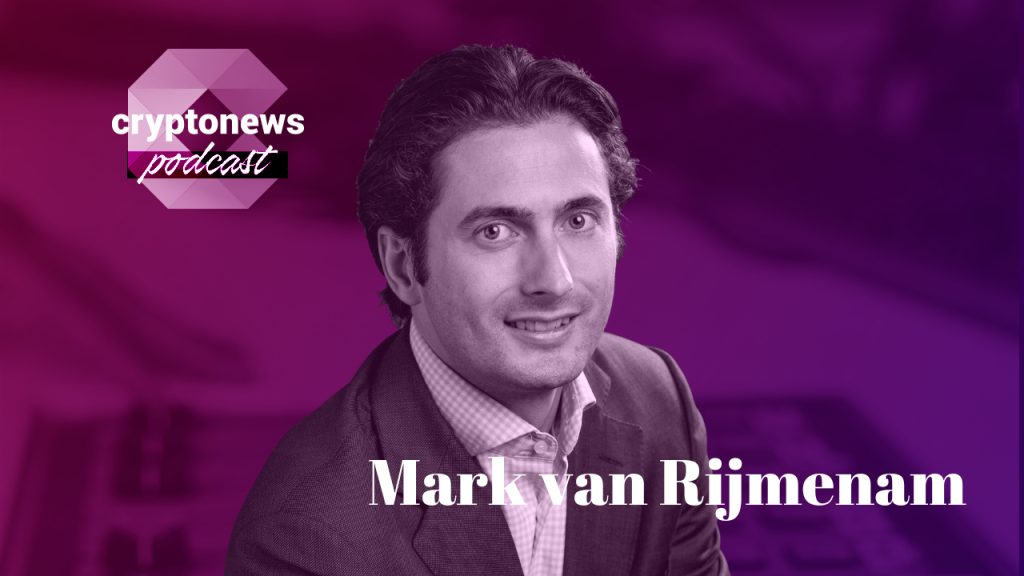Mark van Rijmenam, The Digital Speaker, on the Need for an Open Metaverse and AI

[ad_1]

In an exclusive interview with cryptonews.com, Dr Mark van Rijmenam, The Digital Speaker, talks about the need for an open metaverse, the power of NFTs, the future of AI, and the current crypto economy.
About Dr Mark van Rijmenam
Dr Mark van Rijmenam is The Digital Speaker. He is a leading future tech strategist who thinks about how technology changes organisations, society, and the metaverse. Dr Mark van Rijmenam is an international keynote speaker, 4x author, and entrepreneur. He is the founder of Datafloq and the author of the book on the metaverse: Step into the Metaverse: How the Immersive Internet Will Unlock a Trillion-Dollar Social Economy.
Dr Van Rijmenam is one of the leading voices in technology and known for his candid, educated and balanced views on how technology can benefit but also threaten society. Van Rijmenam’s mission is to help large organisations and governments benefit from innovative emerging technologies, while ensuring that it is done ethically and responsibly. Recently, he founded the Digital Futures Institute, which focuses on ensuring a fair digital future for everyone. The research institute uses innovative storytelling to deliver a deep understanding of digital technology and its long-term implications for all levels of society.
Dr Mark van Rijmenam gave a wide-ranging exclusive interview which you can see below, and we are happy for you to use it for publication provided there is a credit to www.cryptonews.com.
Highlights Of The Interview
The need for an open metaverse – decentralized and consumers owning their dataThe dangers of the metaverse – a centralized entity running the showAI and GPT-3 – what does the future of AI have in store?Being in the internet vs being on the internetWhy crypto will make the metaverse go round



Full Transcript Of The Interview
Matt ZahabLadies and gentlemen, welcome back to the Cryptonews Podcast. We’re buzzing as always, and while I’m recording tonight, my lovely guest is a whopping 16 hours ahead of me always a little tricky when I’m recording at 5pm Eastern Time and my guest it’s 9am for him, absolute banana lands, and I’m super pumped out at sky on. Today we have Dr. Mark van Rijmenam, the Digital Speaker, also known as The Digital Speaker. He’s a leading future tech strategist thinks about how tech changes organizations, society, and the Metaverse. Mark is an international keynote speaker, four times author craziness congrats on that, an entrepreneur, and he founded Datafloq and the author of the book on the Metaverse “Step into the METAVERSE: How the Immersive Internet Will Unlock a Trillion Dollar Social Economy”. Mark has also done much more and we will get into that. However, without further ado, I’m very pumped to have Dr. Mark van Rijmenam on the Cryptonews Podcast. Mark, welcome to the show.
Mark van RijmenamThank you very much, Matt. It’s great to be here. And yeah, it’s always a bit crazy dialing in from the future. It’s already the next day here. So it’s always it still blows my mind how that works.
Matt ZahabTrippy, it always trips me out and truly a treat to have you on. You and I before the show, we were talking a little bit about GPT-3, I think we’re both full on Alex here. And I know it’s very sort of cliche for the tech bros, if you will to be you know, drooling and having so much fun with GPT-3 and more specifically, the new ChatBot that came out. But man, what a fun week. It’s been like, how much fun have you had playing around with this thing?
Mark van RijmenamI have had so much fun. And I’m working on something really cool that I can’t share too much about it yet, but ChatGPT, it’s just insane. I think it’s I’ve been playing around with a couple of days nonstop. I think it achieved a 1 million users in like five days or so. Which shows how insane it is. It’s fantastic technology you can have, you know, ask questions and get detailed answers. I’ve seen posts on LinkedIn. People say this is the end of Google. This is the end of Stack Overflow. This is the end of you know any other platform. And this is based on I think GPT-3, or even I think maybe 3.5. I read somewhere. And this hasn’t even you know, GPT-4 hasn’t even arrived, which they expect in the next couple of months. So yeah, it’s if you haven’t checked out, ChatGPT please do so because it’s absolutely insane what you can do, conversations that you can have, the answer that you can get back if you ask a question. Yeah, it’s astonishing.
Matt ZahabAny Crypto specific use cases that you found or at least played around with yet. Besides the obvious like, you’re a Crypto company and you want to digitalize and you can get you know, GPT-3, the Opening AI ChatBot to write your beautiful ad or if you’re founder and you want a blog post or you want a Tweet or LinkedIn post, so on so forth, anything more niche that perhaps you found that you can tell us because I know you got a bunch of stuff on the back burner that you’re working on right now. But is there anything you can tell us that is sort of Crypto specific regarding to AI?
Mark van RijmenamI haven’t tried it out to be honest. I think it just didn’t have the time yet. I’ve asked a few questions around the Metaverse, and it’s very good at giving the answers on that also asked questions about sort of what’s going to happen in 10, 20, 30 years from now when it comes to the Metaverse and in my book I write about brain computer interfaces. And it pretty much nailed that. So how, yeah, just typically ChatGPT the answer came back to me in terms of what’s going to happen the next 20, 30 years are pretty, I think, pretty interesting to read. So I haven’t specifically played around with you know, asking it for financial advice on which Crypto to invest in. I’m not sure if that will work, but I guess everyone can just try it out.
Matt ZahabWhat about your name? That’s something that and not your last name. Your last name is very interesting as well. And I believe you told me it was Dutch before the show. It is Dutch, correct?
Mark van Rijmenam It is, correct.
Matt Zahab Awesome. And The Digital Speaker. Where did that come from?
Mark van RijmenamSure. So I’ve been doing keynotes for over a decade, helping fortune 500 companies globally speaking at global events. And obviously, when the pandemic hit, my color just got emptied, which was quite frustrating. But obviously, I had to reinvent myself. So I thought, why don’t I practice what I preach. So I digitally transformed myself and came up with the brand The Digital Speaker and make myself available to speak as an avatar, as a hologram or combination of both. And that was three years ago. And since then I’ve explored this further. I’m currently building a digital twin of myself, because I really am like to not only talk about this kind of stuff, but actually also doing this kind of stuff to better understand what the impact of all these new technologies are. So I’m building a digital twin. And at some point, you can have a conversation with me, that sounds like me, move like me, talk like me, looks like me. And I can just do something else go lie on the beach in Sydney as I mature, while my I’ll send my digital twin to work. So, but that’s where it came from, from the pandemic, reinventing myself, digitally transforming myself. And yeah, The Digital Speaker was born.
Matt ZahabAbsolute craziness, man, oh, man. And back in the day when you were moving and grooving. And when you were being flown out to these massive events. And speaking in front of thousands of people, any sort of non-obvious under the table tips or piece of advice that you’d give on public speaking, and all sorts of I’ll start the best one I ever got, I want to say it was from Naval Ravikant and his whole thing was, he gave two tips, he’s like one, pretend you’re speaking to yourself in the shower. And again, that is great public speaking, right? When you’re really just having a dialogue with yourself. And he said, secondly, look above everyone else, don’t make eye contact with anyone. He said, because then everyone will sort of think that you’re looking at them. And it all just works out. But what tips or pieces of advice you have, for anyone who’s public speaking in front of thousands of people?
Mark van RijmenamThat’s interesting, because I would disagree with the last one. Because I would say that, try to pick two or three people in the audience and look them into the eyes. Because you get a better connection, you get a better feeling of how people respond to you to what you’re saying. And then they feel special, because they know that you’re looking them in the eyes. And so that’s one thing. The other thing is if you’re have to deliver your keynote for a very large group, or you’re not very confident about your speaker, or you are new to speaking, new talk that you need to give, practice it in your room, wherever you are, and pretend as if you are delivering your keynote in front of thousands of people already, like really imagine yourself that you did, there’s thousands of people already people sitting in front of you. Because our brains cannot make the difference between imagination and real. So if you did it three times, and then the next day, you actually standing on that stage in front of thousands of people already to your brain is oh, I’ve already done this three times, nothing to worry about. And then it will just work out smoothly.
Matt ZahabAnd that works for you. It’s like you know, no weird exercises, no, like Wolf of Wall Street, you know, humans or anything, just zone and boom, that’s it.
Mark van RijmenamJust get in the zone, just in front of us getting on stage if your breathing exercises, and then off you go. And then yeah, finding your bearings in the first minute and then just you know, deliver an awesome keynote. And yeah, delivering keynotes is just entertainment, you know, you are an entertainer, you’re entertaining people, but you’re trying to entertain in a way that’s, you know, gives them some insights. And I love doing it. I’m very glad that pandemic is over so from that perspective, gets me to fly again, I’ve been to some great locations already this year. And it’s just fantastic to do it. So it’s a wonderful job, very privileged job to have.
Matt ZahabAnother thing that I’m so interested in is sort of the trajectory between almost starting out and speaking for free. And then literally being a keynote speaker and getting paid thousands of dollars, you hear these stories all the time where, you know, X political figures, or X fortune 500 CEOs are getting paid a pretty large five figure sum, sometimes six figures to literally speak for an hour sometimes, you know, five figs for a 25, 30 minute keynote, like walk me through your trajectory from most likely speaking for free to, you know, getting paid a shit ton of money to speak, that must have been a pretty cool, you know, roadmap.
Mark van RijmenamYeah, like, whenever they fly me over. It’s still an amazing experience. So and I always really enjoy it. But it’s quite funny how it started, because I started about a decade ago. And at that time, I was starting a new company, which was the predecessor of what’s now called Datafloq. And it was a platform around Big Data because I thought Big Data is going to be hot. So this was 2012. So, but I didn’t really have much understanding of Big Data myself. So I thought, well, I’m going to teach myself learn, write about it and publish it online. And I was living in Netherlands at the time. And within a month and a half, I was asked to be a keynote speaker at an event. I mean, being the expert on Big Data, which I thought was absolutely ridiculous, but you know.
Matt ZahabAnd then you’ve been working on this for six weeks.
Mark van RijmenamYeah, it’s pretty insane. And yeah, a lot of the blind, the one-eyed man is king, as they say, to say it in Dutch. And then I thought, Oh, I might as well ask money for it. So I straight up asked money for my first keynote, and they said yes. And I never looked back. And since then, of course, my figure has expanded. And yeah, but what people often forget, is that people think well, you get five six figure fee for 30 minutes 60 minutes talk, but that’s not really it. You know, it’s work that you’ve done for the past decade to get practice? Yeah. That’s what’s the value in there, you know, I spent weeks without getting paid, and then you know, having a keynote makes up for that. So, it’s I think that’s really important to be aware of that, you know, people see those figures, but then forget, you know, all the hard work that’s done all the research, all the things, all the investment that you make, and also the travel that it takes to you know, and especially from Australia to fly to Europe, or America to take, it takes me three to five days. So that’s all things that needs to be incorporated. So people think often Oh, that’s a ridiculous amount of money for half an hour. Yes, it is a lot of money for half an hour. But yeah, there’s so much happening on the back to make that happen.
Matt ZahabWell said. What are the biggest difference is, the non-obvious ones between, you know, doing Zoom keynote or doing it in person keynote? Is there any different prep? Is there any, you know, again, I’m talking non obvious stuff, obviously, everyone would be like, you know, good lighting, good audio, make sure you look good. The whole nine yards. But is there anything that you wish you knew, three years ago when you started doing all the virtual keynotes?
Mark van RijmenamNo, I think my challenge with virtual keynotes is that I don’t have that connection that you can have with an in-person keynote, which I think was definitely one of the reasons why I hope that you know, events in the Metaverse or tripled, Phygital events will be much better, because then you can have at least have a two way connection where you can just like in real world, you can look people into the eyes, and you can understand what people think about whenever you’re talking. And if I do a Zoom or Teams call, I just see my screen. You know, I don’t see the other audience. I have no idea how they respond. And that’s, I think, very annoying.
Matt ZahabYeah, that’s so true. And like everyone’s on mute as well. So you literally like know what I’m your crack jokes. Like you don’t even know if anyone’s laughing.
Mark van RijmenamNo, you have no idea, which is quite frustrating. You know, you just assume that people laughing and you just continue on.
Matt ZahabYeah, it is true. It’s very robotic, and a lot of emotional pull in there. Interesting. Mark, you were huge on the Metaverse, you really went all in a couple years ago. And your most recent book, “Step into the METAVERSE”, which we’ll get into later on. But what tickles your fancy so much about the Metaverse? Why? Why did you decide to go all in like and why the Metaverse in particular because a lot of people in Blockchain and Crypto do a whole lot of things, right? Yes. You know, you have founders who just sort of hone in and specialize on one niche aspect of the industry. You chose the Metaverse. Why is that? Why do you love it so much?
Mark van RijmenamWell, I think because the Metaverse is really the convergence of different technologies that I’ve been involved in over the past decade. It’s Big Data. It’s Blockchain. It’s AI. It’s VR AR it’s it really brings everything together. And I think that is what I think is really interesting. And it’s also for me, the Metaverse is not Web3. The Metaverse is not, you know, gaming. The Metaverse is not virtual reality. It can be all of them together, but it’s not them individually. And I think that’s a very important distinction. And the Metaverse it is, in my opinion, just the next iteration of the internet. And we had the first year the Read-Only Web. Then we had the Social Web, we had the Mobile Web. And the Metaverse is the Immersive Web, where we move from, you know, if you want to go on the internet, you have to make an effort, you have to grab your phone, you have to grab your computer or your tablet, to an internet that is there where we are embedded in the internet, where the internet is as pervasive as the air we breathe. And I think that distinction where you move from going on the internet to being in the internet is I think fascinating because it offers a whole lot of new opportunities. And with that we move from a 2D Internet, what we have today to a 3D Internet. And we humans we are made for 3D, we’re not made for 2D. So from that perspective, it’s a much better fit for us humans, to have a 3D Internet, where we can just you know, be connected with the internet all the time, and have conversations as if we have them in real life. And so that I think is just absolutely fascinating. And just, you know, whatever can happen in the next 10,15, 20 years, will completely change our society like redefine our society. So I think everyone who says the Metaverse is a fad because they see crazy monkeys being sold for way too much money. Or they see all the scams with NFTs or scams as ICOs or scams with you know, that we’ve seen happening in the past couple of weeks. I think that is too short sighted. You know, that’s the same thing as people who said that the internet was a fad 25 years ago. It wasn’t but it just takes time. And I think you know what the Metaverse promises us in the next 10, 15 years is absolutely mind blowing and I’m super excited about that.
Matt ZahabYou had such a good line there being in the internet versus being on the internet. That’s gold. I’ve never heard that before. Is that a Mark original? Or do you snag that from someone?
Mark van RijmenamNo, that’s Mark original. Yeah.
Matt ZahabReally good. And it’s so true as well. Like, you don’t really think about it. But that’s exactly what it is. The Metaverse is really you being in the game? Right in the arena. Everyone talks about Liana lives the game, you get to decide what kind of character you are, what kind of characters you engage with, what level you play on, how hard you want to make it, what rewards you get to want to win it all. Blah, blah, blah. But like, that’s the Metaverse. That’s it. You’re literally in the internet. When did you want to point that? Like, I want to know more about this line? I love it.
Mark van RijmenamI think I quoted a couple of weeks ago, when I first when I just described that we’re moving into an era where the internet as pervasive as the air we breathe, I don’t even think it’s in my book, just this line. But it’s, that’s when I thought well, you could actually be moving from making a conscious effort to go on the internet by grabbing your phone to look something up, you know, to just being in there and should be always connected with the Internet. And I think yeah, the potential that it offers, you know, if we look back at 2008 when the first iPhone actually the second iPhone came out with the App Store, the iPhone 3G, from that moment, people started creating apps and you might remember you know, they had apps of drinking beer with your iPhone, you know where you could you saw the glass of empty, you could play the flute, on your iPhone, you know, those kind of things, which are totally fun, and also dandy, particularly if you think about it. But that was 2008. Fast forward 15 years, and we have apps that can do all kinds of crazy stuff. And I think the same thing is what’s going to happen with the Metaverse. You know, we have this very low polygon pixelated, virtual world that not much is happening, not many people are there. And people think that is the Metaverse, that is not the Metaverse, that’s the first apps that are being developed. Well, we are trying to figure out as humans, what the Metaverse means to us, how we can use the Metaverse, what on earth is this technology is and sometimes it’s very early days because the hardware is not there, the software is not there. Just like in 2008 when the first iPhone 3G came up, the iPhone 3G is nothing compared to this iPhone 14 Pro I have here. And yeah, that we should we look at the Metaverse from that perspective, because the same trajectory will happen only it will happen a lot faster.
Matt ZahabAnd very well said folks we’re gonna keep and Mark we’re gonna keep it on the Metaverse but we got to give a huge shout out to our sponsor to the show, we’re gonna take a quick break. That is PrimeXBT I’ve been using of PrimeXBT for a hot minute, as they offer a robust trading system for both beginners and professional traders doesn’t matter if you’re a rookie or a vet. You can easily design and customize your layouts and widgets to best fit your trading style. PrimeXBT is also running an exclusive promo for listeners of the Cryptonews Podcast. Use the promo code CRYPTONEWS50 that’s CRYPTONEWS50, to take advantage of this offer and receive 50% of your deposit credited to your trading account. Again, that is CRYPTONEWS50. All one word to receive 50% of your deposit credited to your trading account. Now back to the show with Mark. One of the things that you talk about a lot which I absolutely love is the need for an Open Metaverse. This is paramount to the Metaverse and the Metaverse is actually being usable. This is paramount for user experience for governance for just about any insert trendy word you want to throw into the sentence. It has to happen. But it’s not easy. And I wouldn’t say it’s looking too hot right now. I feel like it’s gonna be the same as anything else in life. There’s going to be it’s going to be centralized. And there’s going to be covering entities that run the show and own everything. But I’m not the expert in this, you are Mark, why do we need an Open Metaverse?
Mark van RijmenamWell, because we could pretty much screwed up Web2. And, you know, we ended up in internet which is owned or controlled by a few big tech companies. And they have big control of our digital lives. If they don’t like you didn’t lead you. We could see it happening with Twitter at the moment with Musk, you know, he’s completely turning it around not so much for the better, I think. And I think that’s very problematic. You know, a few people control our digital lives with, you know, whatever they are building. And now imagine in the Metaverse, the amount of data that we collect will go hundreds, thousand times more than the data that we’re collecting today. That data in itself will also be a lot more private, a lot more personal, a lot more intimate than the data that it is today. Your email is very personal. Google knows all about it, read all about it and has completed understanding of what your life is about. But the moment we are connecting the Metaverse where we you know, at some point created connecting our biometrics, to control our avatars, to verify our avatars, where we are 10, 15 years down the line where we connect our brains to the internet, which neural link is working hard on, and other companies as well, that’s extremely personal, intimate and private data. I don’t want that data to be in the hands of the Zuckerberg for this world. And your Zuckerberg is not to be trusted. I mean, the other day, I was reading an article that it stated that, you know, in the US, people who fall or use several platforms to file the taxes, that tax file information is being sent to Facebook to feed and to train their advertising.
Matt Zahab Of course, it is.
Mark van Rijmenam Yeah, but I know it is. But that’s insane. You know, we should not want that. And, you know, with, especially with more data being collected and created in the Metaverse, we should have full control over our own data, of our own digital assets. And over our own identity, especially with Generation Z, and those born after 95, Generation Alpha, those born after 2010. For many, if not all their digital identities as if not more important than their physical identity. Now, let that sink in a little bit, because that’s crazy, you know that your digital identity is as important or more important than your physical identity. If you’re if that’s the case, you want to have full control over your digital identity. Because if you don’t, you know, if you do something that big tech doesn’t like, you can lose your digital identity. And I think that’s problematic. Of course, with a fully decentralized identity, fully decentralized system, there are its own problems. But I think in the end, we should have the control over our own data, we should not be dependent on others.
Matt ZahabAgain, bang on that’s, it’s not going to happen, though, like, do you really think that’s going to happen? I personally, I try to be an optimist. But if I put the realist goggles on, I just can’t see it off. And Mark, I just can’t see it. I feel like it’s going to be I don’t know if it’s going to be Meta, or if it’s going to be some, you know, Animoca Brands. And there’s another thing to all the Crypto companies who say they’re building a decentralized, fully Open Metaverse, I don’t know if that’s going to be the case, it would just make so much more sense from a profitability standpoint, to keep things closed and have total control. And it’s like anything else in life, the classic tale of becoming wealthy, everyone’s like, Oh, if I make 50 mil, I’m gonna wrap it up, you know, golf, like me, if I’m like, Oh, if I make 50 mil, I’m gonna, you know, make sure that my family and their family and their families are set for life, well, you know, be smart with my money, but I’m going to golf every day, I’m going to be sick, I’m going to be scratch golfer, I’m gonna have a blast, you know, travel the world, blah, blah, blah, I say that. But if, when hopefully when I get to that point, I’m probably gonna keep working. Because once you take a little bit of power and money, you want more of it, it’s going to be the exact same with the Metaverse, if there’s one entity that has first to market mover advantage, and somehow breaks the floodgates open and users by the millions start being on boarded every day, I just can’t see them doing the right thing and being like, we’re going to open it up and let everyone you know, come and have a seat at the table, it just makes sense to close the doors and to run the show. I can’t see it happening. I don’t mean to be a dick and a pessimist, you know.
Mark van RijmenamBecause I’m an optimist as well, but I tend to agree with you. And I think that really worries me because we should not move into that direction. Because you know, it’s yes, you will have a few big tech companies who will become extraordinarily rich, like, even more rich than the big tech companies are today, because we’ll have hundreds, thousand times more data than today. So that will you know, from an inequality perspective will only grow, like 10, 100 fold. However, I think we should not want that direction. Because I think as I write in my book, you know, if we have a more open economy that will deliver traded on us for global society. So as companies, as individuals, we should have a more long-term stakeholder approach, instead of a short-term shareholder approach. Now, that is extremely difficult, because as you rightly say, you know, you if you have if a company is very familiar, want to continue building and hopefully sell it for a billion dollars. And then your big tech is eating up all these startups and you give a fat paycheck to the startup founders, they love it. But in the meantime, big tech gets bigger. So we have all these wrong incentives. At the same time, I think another problem is that the general public is not educated enough. You know, we are all digital natives. But we’re not necessarily digitally literate. So we don’t know really how to understand and how to behave in digital world and what the consequences are for our actions. And big tech really made use of that, because they created all these fantastic technologies, made it really seamless experience. And then we made it free, you know, so everyone was hooked immediately. And as a consequence, we sort of sleepwalk into a sort of a corporate or state surveillance society that we have today. Now, if we want to change that what we need is we need education. We need to educate the general public, to educate the next generation to change their perspective so that they understand that they can actually vote with that data. Because if we understand that we can vote with our data, then we can make a difference. Now we can say, Okay, we don’t want Mr. Zuckerberg to control our lives. So let’s not use Mr. Zuckerberg sir technology, and we move somewhere else. But it’s extremely hard, especially because there are decentralized exchanges, the decentralized world doesn’t really use isn’t really very easy to use, you know, if you want to buy an NFT, if you want to drop the NFT and DeFi protocol to get a loan to build a business. That’s very hard work at the moment now, and 90%, 99% of people are scared of venturing into debt, because the risk of losing your money is really big if you do the wrong thing, which is very easy to do. So we have several problems. Here we have the problem that startup founders of being offered that paycheck for big tech, and often find it hard to say no to that we have. The second problem is that startup founders who are building really cool technology often think very short-term shareholder perspective, because they are being driven by VCs who want their money back. And often don’t really think about the consequence, whatever they’re building. The third problem is that we have the general public, which is not very well educated. And I can’t blame the general public on that, because the technology is moving crazy fast at the moment. So it’s very difficult to keep up. But together these three problems. And a fourth problem is because it’s very hard. It’s a moment in a Meta version, a decent branch of decentralized world to build anything. So what will probably happen is the same thing has happened in that one, back in the days when it was very hard to speed up a website to build an app to do whatever thing you had these companies who thought well we’ll make this very easy for you. And you know, we’ll give it we create a seamless experience. We give it away for free. And as a consequence, we have big tech that we have today. The same thing will happen in the Metaverse, all you have companies will make it very easy. EPIC and VIDYA, UNITY, to build decentralized, to build immersive experiences, will have probably other platforms will make it easy to build all kinds of other technologies for the Metaverse. And as a consequence, they will be the new big tech, so we have four problems that limit our chances to success of an Open Metaverse. However, that doesn’t mean we should try our best to ensure an Open Metaverse because I believe that if we don’t end up in an Open Metaverse, well a bit of pretty dystopian future. So yes, we have all these headwind, but we really should do whatever it takes to try to achieve that Open Metaverse. And that was also the objective of my book, “Step into the METAVERSE” that’s why I founded a research institute called the Digital Futures Institute to ensure a thriving digital future for both business and society. Because we really need to, and we only have you know, as I quoted Eminem in his book, we have one shot, one opportunity, you know, and we are we going to take this opportunity to do it differently, or are we not? And I think that’s the big question.
Matt Zahab Tell me more about your fourth book and it is called “Step into the METAVERSE”. It’s a book about an Open Metaverse and to gather you know the appropriate data and opinions for this book. You did 100 interviews with some of the biggest stakeholders in Crypto Blockchain Metaverse, more specifically, you also turn these into a podcast pretty smart if I must say because now you’re just creating a friggin content machine like it’s not bad. You also let me know maybe I should wakey-wakey and do the same out 185 episodes. Like there’s a lot of gold in there. So thanks for the motivation. But tell me more about the book and what it’s all about.
Mark van RijmenamSure. The book is really about what is the Metaverse and how can we create an Open Metaverse? So it’s meant as a blueprint for an Open Metaverse. As I said, I did 100 interviews with the stakeholders. Building the Metaverse, I did another 150 surveys with other people because I couldn’t have 20, 50 interviews, it was a bit too much. And that really helped me get a very deep understanding of how can we create an Open Metaverse? What is required to build Metaverse? What if we have an Open Metaverse? How will this impact organizations? How will that impact enterprises? How will it impact the public sector? How can we use the Metaverse for training, for education, for entertainment, for sports? How? What are the economics of the Metaverse? What role do NFTs play because they play a really big role together with Crypto. But also I think very importantly, what are the dangers of the Metaverse? Because if we understand the dangers of the Metaverse, which will be significantly bigger than all the dangers that we have currently on the web. It helps prepare for that. So it’s yeah, it’s a full book about if you read it, you have a deep understanding of what the Metaverse is, how you can apply it as an organization, regardless of the business that you’re in. But also what are the different points that you that you need to take into account as an example if you try to build a virtual community, a virtual world, a DAO, you really need to think very hard about the governance structure that you’re going to implement. Because what you’re building basically sort of a society you know, it’s this job you’re building a society of people that are coming together as a community that interact. And if you don’t think about the governance structure, what is allowed, what’s not allowed? How do you interact? What do you do when people don’t do the right thing? If you don’t think about it in advance, it will become an afterthought. And then we’ll end up into problems just like the problems that we have at the moment.
Matt ZahabMark, you’re is switched on man. Well done here. Look, we are a little tight for time. We always do a segment on the show called the hot take factory, you want to you and I step and we put our shaky boots on, give me some Mark hot takes, can be anything, doesn’t have to be Crypto, Metaverse, Blockchain related, can be sports, politics, food, geography, space, tech, you name it, give me a couple of Mark hot takes?
Mark van RijmenamWell, I think my main hot take is that we are living in exponential times, and the world is changing faster than ever before. And it’s going to change and it’s only going to accelerate. So if we don’t want to be left behind, if you don’t want to miss the bandwagon, which by the way, has already left any speeding up. We really have to make an effort, we have to make a conscious effort to understand how this world is changing, how the digital world is changing? And how can we play a part of that. That applies to individuals, it applies to government that applies to startups, it applies to enterprise organizations. If we are if we don’t have a deep understanding of all these technologies, of ChatGPT, of Crypto, of the Metaverse, of VR, of internal things, of 3D printing, of AI, etc, we are going to be left behind because the world is moving on. And if you as an organization in whatever industry you’re in, you don’t pay attention to these technologies, you will be disrupted, and you will be the next block blockbuster. So we have to really educate ourselves, and to make sure that we understand what is happening. And we have to do so in ways that apply to our lives, our business, so that we can actually relate to it. I think that is the most important message is you know, try to understand what’s happening because the world will never be the same, you know.
Matt ZahabIt’s moving quick, Mark. Well said, Man, really appreciate you coming on. Before you go, can you please let our listeners know where they can find you? Where they can find your new book, “Step into the METAVERSE”, and where they can find more about The Digital Speaker online and on socials.
Mark van RijmenamSure, so you can find me on thedigitalspeaker.com. I’m on Twitter at with the handle @VanRijmenam, which you might find I had that because it’s difficult to write. And, but if you if you look for my name on The Digital Speaker, you can quite easily find me on LinkedIn, on Instagram. And my book is available on all the big online bookstores, Amazon, as well as some offline bookstores. So please reach out to me I’m happy to connect with anyone to discuss these kinds of emerging cutting-edge technologies and how they will impact you personally as well as your organization.
Matt ZahabMark. Thanks for coming on, man. Really appreciate this. I learned a ton and you’re a great speaker. No shit, but really appreciate it. Wishing you all the best. And heck, I just go Netherlands you guys got a little run in the World Cup.
Mark van RijmenamYes we do. We beat the USA. So that’s good.
Matt ZahabYou guys are looking like a wagon. I bet could be a nice.
Mark van RijmenamIt’s gonna be over tomorrow on Friday, so it’s gonna be over in the heartbeat. But so far it’s going well, but thanks for having me on the show, Matt. It’s been an absolute pleasure.
Matt ZahabThanks, Mark. Folks, what an episode with Dr. Mark van Rijmenam from The Digital Speaker and four times author and his most recent book “Step into the METAVERSE”, as always, I will include the links to absolutely everything in the show notes. What a great episode with Mark dropping tons of knowledge bombs for us to the listeners. Love you guys. Thank you so much for listening. As always keep on growing those bags. Keep on staying healthy, wealthy and happy, and to the team. Love you guys. Thanks again. Bye for now we’ll talk soon
[ad_2]
Source link









